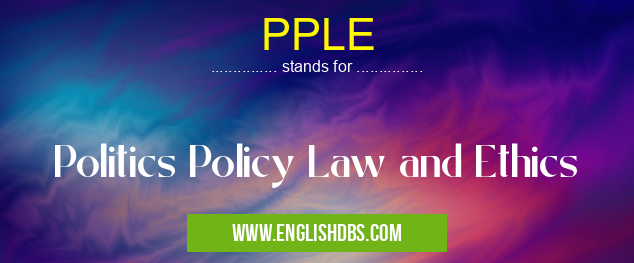What does PPLE mean in POLITICS
PPLE stands for Politics, Policy, Law, and Ethics. It represents a broad field of study that encompasses the intersection of these four disciplines. Professionals in this field analyze and influence the decision-making processes that shape society.

PPLE meaning in Politics in Governmental
PPLE mostly used in an acronym Politics in Category Governmental that means Politics Policy Law and Ethics
Shorthand: PPLE,
Full Form: Politics Policy Law and Ethics
For more information of "Politics Policy Law and Ethics", see the section below.
» Governmental » Politics
Politics
Politics involves the processes by which power is distributed and exercised within a society. It encompasses activities such as elections, political campaigns, lobbying, and negotiations. Political scientists study how these processes impact society and how they can be used to address social issues.
Policy
Policy refers to the guidelines and decisions made by government or other organizations to achieve specific goals. Policy analysts examine the development, implementation, and evaluation of policies. They assess their effectiveness and make recommendations for improvements.
Law
Law encompasses the rules and regulations that govern society. Lawyers and legal scholars interpret and apply the law to resolve disputes, protect rights, and uphold justice. They play a crucial role in ensuring adherence to legal principles and safeguarding the rule of law.
Ethics
Ethics refers to the principles and values that guide moral decision-making. Ethics professionals help organizations and individuals navigate ethical dilemmas, such as those involving conflicts of interest, discrimination, and environmental sustainability. They promote ethical conduct and ensure that actions align with societal values.
Essential Questions and Answers on Politics Policy Law and Ethics in "GOVERNMENTAL»POLITICS"
What is the definition of politics?
Politics is the process of making decisions for a group of people. It involves the allocation of power and resources, and the resolution of conflicts.
What is the difference between policy and law?
Policy is a set of principles that guide decision-making, while law is a set of rules that are enforced by the government. Policy is often more flexible than law, and can be changed more easily. Law, on the other hand, is more binding and difficult to change.
What is the role of ethics in politics?
Ethics is the study of what is right and wrong. It provides a framework for thinking about political decisions and actions, and helps to ensure that they are fair and just. Ethical principles can be used to evaluate the actions of politicians, and to hold them accountable for their decisions.
What are some of the key issues in politics today?
Some of the key issues in politics today include:
- Economic inequality
- Climate change
- Healthcare
- Education
- Immigration
- Foreign policy
How can I get involved in politics?
There are many ways to get involved in politics, including:
- Voting
- Donating to campaigns
- Volunteering for candidates or causes
- Running for office
Final Words: PPLE represents a dynamic and interconnected field of study that examines the complex relationships between politics, policy, law, and ethics. Professionals working in this field play a vital role in shaping society, ensuring ethical decision-making, and addressing complex social issues. The study of PPLE provides a comprehensive understanding of the processes and principles that govern our world.
